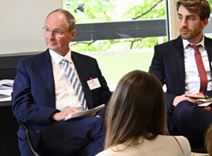Wall Street Journal January 19, 2014
Wall Street Journal January 19, 2014
Iran Likely to Spend Oil Funds on Aircraft, Car Parts, Says Deputy Oil Minister
Funds Expected to Be Unfrozen as Part of Nuclear Deal with West
By Benoît Faucon
....................
But for Iranian economic officials, the race is now on to drum up international interest. Iran has to maximize its diplomacy efforts now because "the window could always close" amid the threat of a political backlash, in either Tehran or Washington, said Denis Florin, head of the Paris-based energy advisory firm Lavoisier Consulting.
..............................
Iran Likely to Spend Oil Funds on Aircraft, Car Parts, Says Deputy Oil Minister
Funds Expected to Be Unfrozen as Part of Nuclear Deal with West
By Benoît Faucon
Updated Jan. 19, 2014 3:06 p.m. ET
TEHRAN, Iran—Iranian energy officials sketched out their vision of an economic détente with the West—promising a revamp of the energy sector and financial benefits for companies willing to re-engage with the Islamic Republic.
On the eve of a temporary easing of sanctions against the Islamic Republic, an Iranian deputy oil minister said Tehran was likely to spend billions of dollars in soon-to-be-unfrozen oil proceeds on buying a wide range of goods from U.S. and European companies.
A separate oil official, involved in drafting contracts for exploiting Iran's energy reserves, said Tehran was soliciting feedback from Western oil firms about how to restructure those contracts in a way that would draw more global interest.
Six Western powers have agreed to temporarily ease some sanctions, allowing Iran to buy Western goods such as cars, airplane parts and precious metals and to sell products including petrochemicals, among other measures. The deal will also unfreeze some oil payments that Tehran hasn't been able to access, and it will allow for the financing of some humanitarian purchases, for instance of food and medicine.
The relaxation is set to officially take effect on Monday, though many companies newly able to do business with Iran are likely to spend weeks, if not months, sorting through the legal and logistical hurdles that still may lie ahead for resuming commercial ties, industry officials say.
The easing is temporary and contingent on Iran's living up to its side of the bargain in a broad agreement over its nuclear ambitions. Political opposition in Washington against any further easing of sanctions and from some in Tehran against closer ties with the U.S. could also scuttle any longer-term thaw.
But for Iranian economic officials, the race is now on to drum up international interest. Iran has to maximize its diplomacy efforts now because "the window could always close" amid the threat of a political backlash, in either Tehran or Washington, said Denis Florin, head of the Paris-based energy advisory firm Lavoisier Consulting.
In a weekend interview with The Wall Street Journal here, Ali Majedi, deputy oil minister in charge of international affairs and commerce, said Tehran would likely be spending $4.2 billion in cash that is expected to be unfrozen by the temporary deal on goods such as foodstuffs, aircraft, machinery and auto parts from the U.S. and Europe.
Allowing this money to move freely opens "a new window of cooperation with the Europeans and the U.S.," Mr. Majedi said.

